We may not have the course you’re looking for. If you enquire or give us a call on + 1-866 272 8822 and speak to our training experts, we may still be able to help with your training requirements.
We ensure quality, budget-alignment, and timely delivery by our expert instructors.
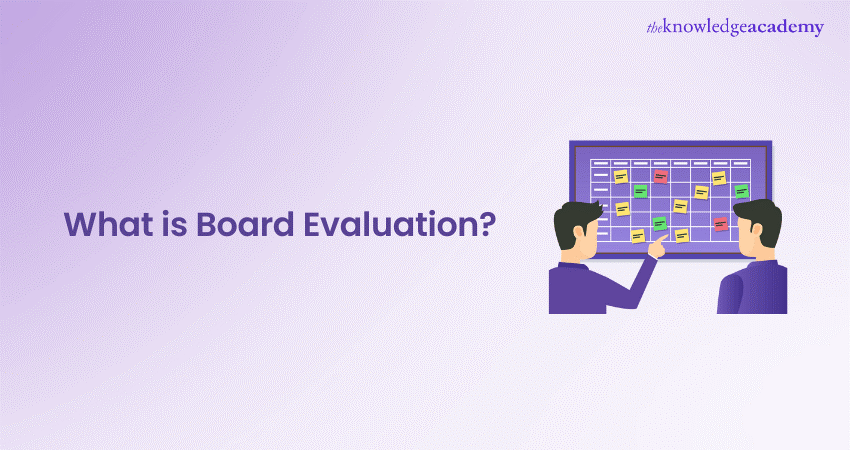
Have you ever wondered what keeps a high-performing board truly effective? It’s not just about brilliant minds or sharp strategies—it's about self-assessment and accountability. Step into the realm of Board Evaluation, where boards pause to assess, recalibrate, and ensure they’re not just meeting standards but setting new ones.
Board Evaluations aren’t just routine checklists; they’re a powerful tool for boosting transparency, enhancing decision-making, and identifying areas for growth. In this blog, we’ll explore what Board Evaluations are, key features and the steps to carry them out successfully. Whether you’re a board member, executive, or governance professional, you’ll find practical insights and proven strategies to maximise the impact of your board’s assessment.
Table of Contents
1) What is a Board Evaluation?
2) Key Features of Board Evaluation
3) Step-by-Step Guide to the Board Evaluation Process
4) Best Practices for Conducting Board Evaluations
5) Conclusion
What is a Board Evaluation?
A Board Evaluation is a systematic assessment of a board’s overall performance, often considering individual director contributions, strategic direction, and collective governance. It goes beyond routine reviews by identifying strengths, uncovering areas for improvement, and establishing actionable steps to enhance board effectiveness.
Regular Board Evaluations foster a culture of accountability, ensuring the board aligns with the organisation’s mission and adapts to evolving challenges. It encourages transparency and creates opportunities to address skill gaps or role-specific needs, all with the aim of improving corporate governance and fulfilling the board’s fiduciary responsibilities.
Who Should Perform Board Evaluations?
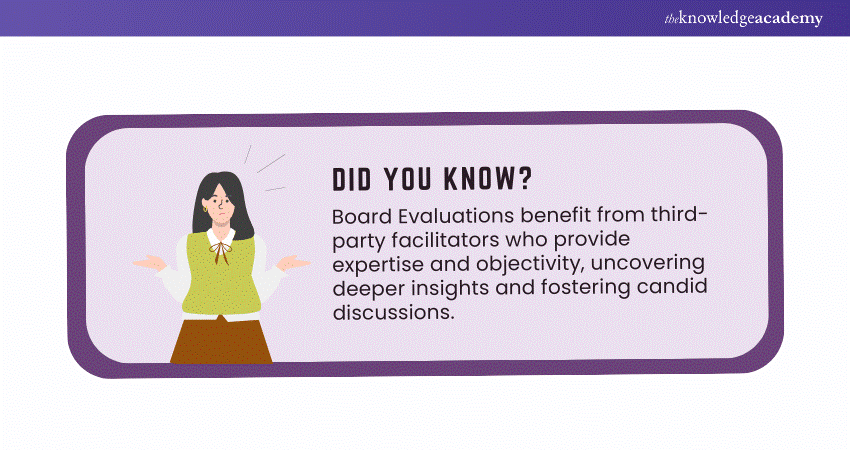
While internal board members and senior leadership can conduct Board Evaluations, involving a third-party facilitator is highly recommended for an objective perspective. A third-party consultant brings expertise in governance and impartiality, allowing directors to speak candidly and fostering trust within the process.
Internal reviews can still be valuable, especially when conducted under a structured framework. However, third-party evaluators are more likely to uncover insights that might otherwise go unnoticed, helping boards avoid common pitfalls of self-assessment. Board members should feel comfortable with the evaluator, as a respectful and open environment is crucial for a successful evaluation.
Key Features of Board Evaluation
A well-designed Board Evaluation focuses on a range of elements to ensure a holistic assessment. Here are some key features:
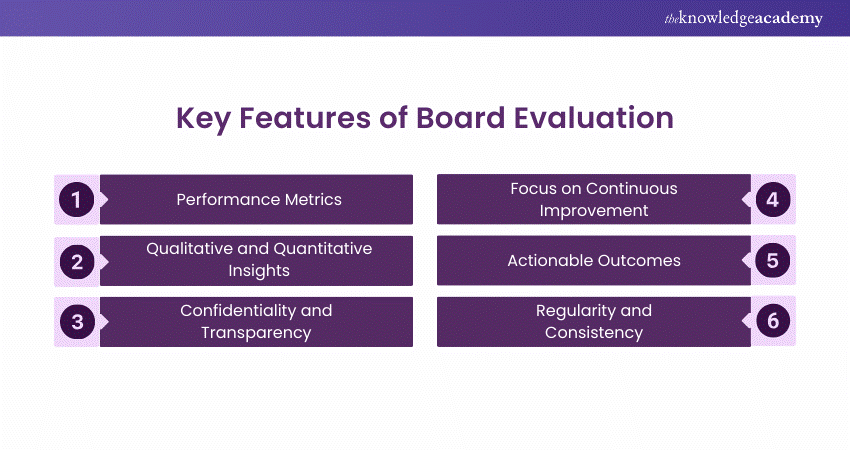
1) Performance Metrics: Establish clear criteria for assessing board and individual director performance. Metrics might include decision-making, strategic guidance, ethical standards, and alignment with organisational goals.
2) Qualitative and Quantitative Insights: Effective evaluations incorporate both qualitative insights (such as feedback from interviews) and quantitative data (such as survey scores). Combining these offers a balanced view of performance.
3) Confidentiality and Transparency: To encourage honest feedback, ensure that all responses remain confidential. This builds trust among board members and increases the evaluation’s effectiveness.
4) Focus on Continuous Improvement: The goal of a Board Evaluation isn’t to criticise but to identify areas for growth. It should serve as a catalyst for ongoing improvement and adaptability.
5) Actionable Outcomes: Every Board Evaluation should lead to specific, actionable outcomes. This could be recommendations for new training, restructuring the board, or refining strategic focus areas.
6) Regularity and Consistency: Regular evaluations – at least annually – provide a consistent benchmark for the board’s progress. They can also reveal trends over time, highlighting areas where sustained effort is required.
Unlock your leadership potential! Sign up for our Directors Development Training and lead your organisation to new heights – join now!
Step-by-step Guide to the Board Evaluation Process
To ensure an effective and comprehensive Board Evaluation, follow these steps:
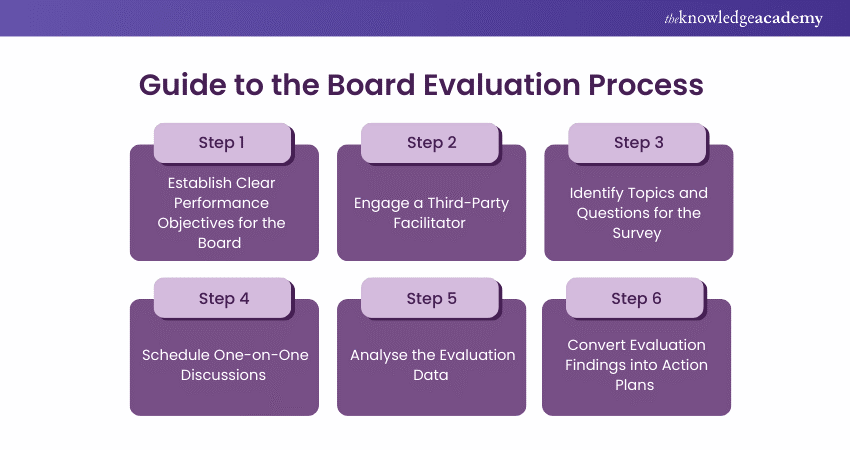
Step 1: Establish Clear Performance Objectives for the Board
Begin by setting clear objectives that define what successful board performance looks like. Are you aiming to assess strategic alignment, governance quality, or director contributions? Be specific about your goals to shape the evaluation criteria effectively.
These objectives serve as a baseline for measuring success, aligning everyone’s expectations, and setting the tone for a constructive evaluation.
Step 2: Engage a Third-Party Facilitator
Consider bringing in a third-party evaluator to provide an unbiased, expert perspective. A professional evaluator understands governance challenges and can guide the process with experience.
They’ll ensure confidentiality, encourage candour among directors, and apply industry best practices. A third-party facilitator also brings valuable insights from other boards, making the evaluation process richer and more objective.
Step 3: Identify Topics and Questions for the Survey
Crafting the right questions is essential for a meaningful Board Evaluation. Your survey or questionnaire should cover a range of topics such as strategic direction, director effectiveness, leadership style, risk management, and ethical practices.
Customise questions to your board’s unique context, ensuring they’re open-ended enough to gather insightful responses. Sample questions could include:
How effective is the board in setting strategic direction?
Are there areas where the board could improve its oversight?
How well do board members work together in decision-making?
Step 4: Schedule One-on-One Discussions
While surveys offer a structured approach, one-on-one interviews provide an opportunity for deeper insights. These discussions allow directors to elaborate on survey responses, share concerns, and discuss board dynamics candidly.
One-on-one sessions also create space for exploring sensitive issues that might not emerge in group settings, making them a valuable part of the evaluation process.
Step 5: Analyse the Evaluation Data
After gathering responses, it’s time to analyse the data. Look for patterns and trends, identifying areas where board members agree or diverge. Use both quantitative and qualitative findings to paint a comprehensive picture of the board’s strengths and areas needing improvement. An objective analysis can reveal gaps in skills, decision-making processes, or strategic alignment that the board can address proactively.
Step 6: Convert Evaluation Findings into Action Plans
An evaluation is only as effective as the actions that follow. Convert insights into specific, actionable recommendations, prioritising the most critical areas for improvement. Set achievable timelines, assign responsibilities, and monitor progress. This step transforms the evaluation from a feedback exercise into a practical tool for board growth and improved governance.
Best Practices for Conducting Board Evaluations
To make the most of Board Evaluations, follow these best practices:
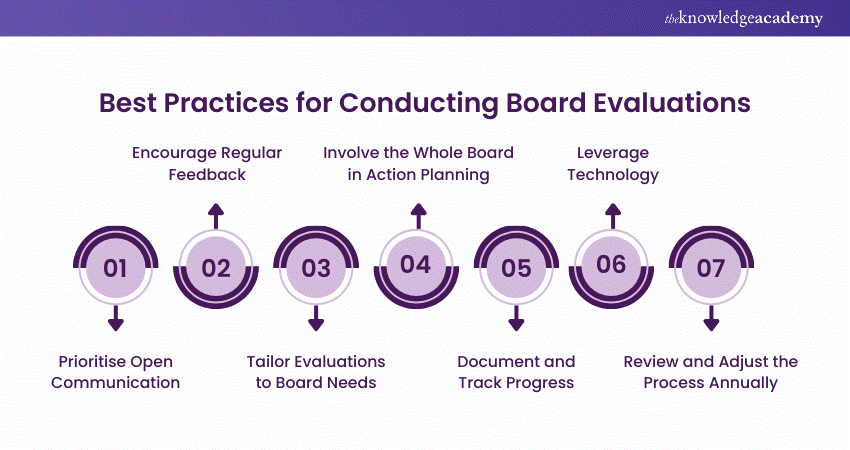
1) Prioritise Open Communication: Create a culture where directors feel comfortable sharing honest feedback. Transparent communication fosters trust and maximises the benefits of the evaluation.
2) Encourage Regular Feedback: Annual evaluations are valuable, but encouraging ongoing feedback ensures the board stays responsive and agile. Consider implementing mid-year check-ins to maintain momentum.
3) Tailor Evaluations to Board Needs: No two boards are alike. Customise your evaluation process to reflect the unique challenges, goals, and context of your board.
4) Involve the Whole Board in Action Planning: When the board collectively discusses and agrees on action steps, everyone becomes invested in implementing changes. Involvement from all members is key to sustainable improvement.
5) Document and Track Progress: Maintain a record of recommendations, follow-up actions, and progress over time. This ensures accountability and allows the board to track its improvement journey.
6) Leverage Technology: Digital platforms can streamline the evaluation process, making it easier to collect, analyse, and report feedback. Technology also improves confidentiality, giving directors a secure way to share feedback.
7) Review and Adjust the Process Annually: As board composition and organisational goals evolve, so should the evaluation process. Regularly assess and refine the evaluation framework to keep it relevant and effective.
Ready to lead with confidence? Join our Personal and Organisational Development Course and take the first step to success – Register now!
Conclusion
Board Evaluation is a powerful tool for driving meaningful change, promoting transparency, and enhancing governance standards. By following a structured process and embracing best practices, boards can identify areas for improvement, strengthen their effectiveness, and align more closely with organisational objectives. Embracing this practice reflects a commitment to high governance standards and positions the board to lead with clarity and purpose in an ever-evolving business landscape.
Empower your career! Register for our Introduction to Management Course and learn to lead with confidence and impact – Join today!
Frequently Asked Questions

The main objectives are to assess board effectiveness, enhance performance, ensure alignment with the organisation’s goals, identify areas for improvement, and foster accountability among board members.

Typically, evaluations use a 5-point or 10-point Likert scale, where members rate various aspects from "strongly disagree" to "strongly agree." Custom scales are also used to assess specific board performance metrics.

The Knowledge Academy takes global learning to new heights, offering over 30,000 online courses across 490+ locations in 220 countries. This expansive reach ensures accessibility and convenience for learners worldwide.
Alongside our diverse Online Course Catalogue, encompassing 19 major categories, we go the extra mile by providing a plethora of free educational Online Resources like News updates, Blogs, videos, webinars, and interview questions. Tailoring learning experiences further, professionals can maximise value with customisable Course Bundles of TKA.

The Knowledge Academy’s Knowledge Pass, a prepaid voucher, adds another layer of flexibility, allowing course bookings over a 12-month period. Join us on a journey where education knows no bounds.

The Knowledge Academy offers various Management Courses, including the Directors Development Training, Management Training for New Managers and the Introduction to Managing People Course. These courses cater to different skill levels, providing comprehensive insights into How to Become a Board Member.
Our Business Skills Blogs cover a range of topics related to Management, offering valuable resources, best practices, and industry insights. Whether you are a beginner or looking to advance your Management Skills, The Knowledge Academy's diverse courses and informative blogs have got you covered.
Upcoming Business Skills Resources Batches & Dates
Date
 Directors Development Training Course
Directors Development Training Course
Thu 30th Jan 2025
Thu 20th Mar 2025
Thu 8th May 2025
Thu 17th Jul 2025
Thu 25th Sep 2025
Thu 6th Nov 2025
Thu 13th Nov 2025







 Top Rated Course
Top Rated Course



 If you wish to make any changes to your course, please
If you wish to make any changes to your course, please


